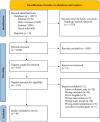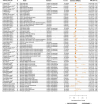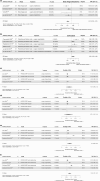Do hormones and surgery improve the health of adults with gender incongruence? A systematic review of patient reported outcomes
- PMID: 39973516
- PMCID: PMC12105570
- DOI: 10.1111/ans.70028
Do hormones and surgery improve the health of adults with gender incongruence? A systematic review of patient reported outcomes
Abstract
Background: Gender diverse people in Australia have higher levels of psychological stress, suicidal ideation and suicide attempts and have poorer self-reported health than cisgender people.
Objectives: To determine if adults who experience gender incongruence have improved health-related quality of life and mental health with gender affirming treatment (hormone therapy and surgery), compared with no treatment.
Data sources: PubMed, Web of Science, Embase and Psych Info.
Review methods: A systematic review of peer-reviewed publications in English from January 2010 to October 2022. Studies were included where: participants were treated with gender affirming surgery or hormone therapy for minimum 3 months and; validated patient reported outcome measures of health-related quality of life or mental health were reported. Quality of evidence assessment was undertaken using the Let Evidence Guide Every New Decision evaluation tool.
Results: Eighty-one publications were included for analysis. The systematic review indicated that there were significant improvements in the domains of mental illness, gender dysphoria, body image and health-related quality of life following gender affirming medical treatment as measured by a variety of patient reported outcomes. Meta-analysis showed significant improvement in body image (z = 4.47, P < 0.001) and health-related quality of life for psychological (z = 1.99, P = 0.047) and social relationships (z = 3.09, P = 0.002) following gender affirming surgery.
Conclusions: There is evidence that hormones and surgery as a collective for adults with gender incongruence has therapeutic value and should be considered for funding within Australia's healthcare systems. The development and implementation of patient-reported outcome tools tailored for purpose (GENDER Q) will facilitate future research.
Keywords: gender‐affirming care; systematic review.
© 2025 The Author(s). ANZ Journal of Surgery published by John Wiley & Sons Australia, Ltd on behalf of Royal Australasian College of Surgeons.
Conflict of interest statement
None declared.
Figures








References
-
- Coleman E, Bockting W, Botzer M et al. Standards of Care for the Health of transsexual, transgender, and gender‐nonconforming people, version 7. Int. J. Transgend. 2012; 13: 165–232.
-
- Hill AO, Bourne A et al. Private Lives 3:The Health and Wellbeing of LGBTIQ People in Australia. Melbourne, Australia: Australian Research Centre in Sex, Health and Society, La Trobe Univeristy, 2020.
-
- Hyde Z, Doherty M et al. The First Australian National Trans Mental health Study: Summary of Results Perth. Australia: School of Public Health, Curtin University, 2014.
Publication types
MeSH terms
Substances
LinkOut - more resources
Full Text Sources
Medical

